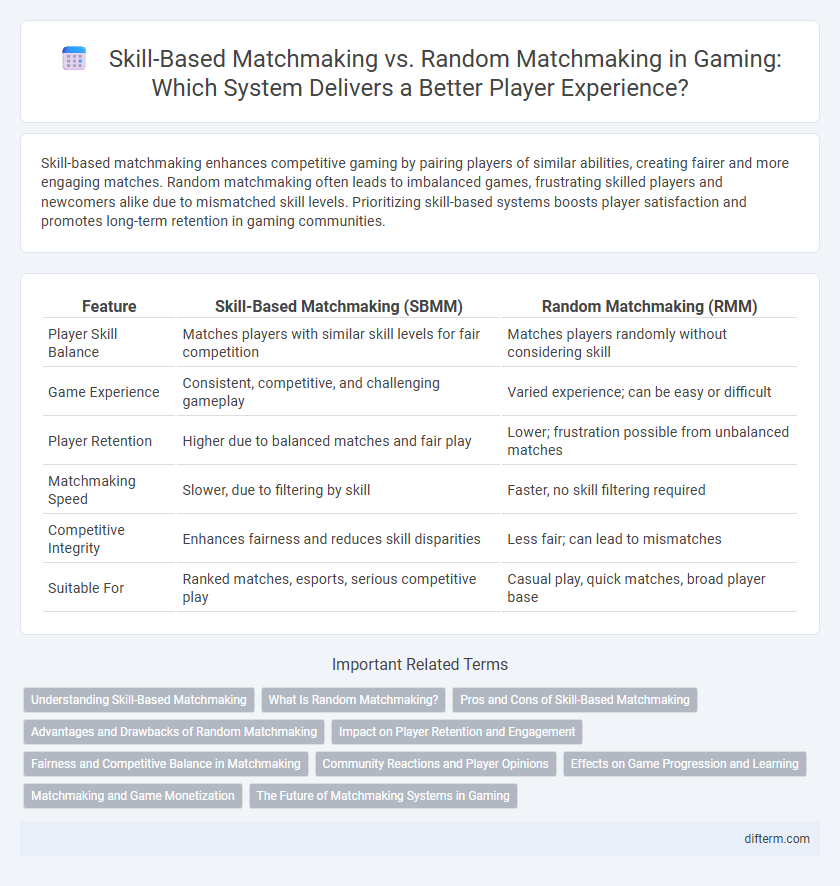Skill-based matchmaking enhances competitive gaming by pairing players of similar abilities, creating fairer and more engaging matches. Random matchmaking often leads to imbalanced games, frustrating skilled players and newcomers alike due to mismatched skill levels. Prioritizing skill-based systems boosts player satisfaction and promotes long-term retention in gaming communities.
Table of Comparison
| Feature | Skill-Based Matchmaking (SBMM) | Random Matchmaking (RMM) |
|---|---|---|
| Player Skill Balance | Matches players with similar skill levels for fair competition | Matches players randomly without considering skill |
| Game Experience | Consistent, competitive, and challenging gameplay | Varied experience; can be easy or difficult |
| Player Retention | Higher due to balanced matches and fair play | Lower; frustration possible from unbalanced matches |
| Matchmaking Speed | Slower, due to filtering by skill | Faster, no skill filtering required |
| Competitive Integrity | Enhances fairness and reduces skill disparities | Less fair; can lead to mismatches |
| Suitable For | Ranked matches, esports, serious competitive play | Casual play, quick matches, broad player base |
Understanding Skill-Based Matchmaking
Skill-based matchmaking (SBMM) pairs players with others of similar skill levels to create balanced and competitive gaming experiences. This system uses algorithms analyzing performance metrics such as win-loss ratios, accuracy, and completion times to dynamically adjust matchmaking pools. Understanding SBMM helps players recognize the impact on fairness and enjoyment compared to random matchmaking, which prioritizes speed over competitive balance.
What Is Random Matchmaking?
Random matchmaking pairs players without considering skill level, creating unpredictable and varied gameplay experiences. This system often matches newcomers with veteran gamers, leading to unbalanced matches and potential frustration. Unlike skill-based matchmaking, random matchmaking prioritizes quick match formation over competitive fairness.
Pros and Cons of Skill-Based Matchmaking
Skill-based matchmaking (SBMM) enhances competitive balance by pairing players of similar skill levels, resulting in more challenging and fair gameplay. It reduces frustration for beginners by avoiding matches against highly skilled opponents but can lead to longer wait times and higher pressure on players striving to improve. However, SBMM sometimes diminishes casual enjoyment by intensifying competition and can cause skilled players to face consistently tough matches, impacting overall game fun.
Advantages and Drawbacks of Random Matchmaking
Random matchmaking offers a unique and unpredictable gaming experience by pairing players without considering skill levels, which fosters diversity and challenges adaptability. However, this approach can result in unbalanced matches, leading to frustration among skilled gamers and negatively impacting overall game fairness and competitiveness. The lack of skill calibration often causes mismatched player performance, reducing engagement and long-term retention within multiplayer communities.
Impact on Player Retention and Engagement
Skill-based matchmaking (SBMM) significantly enhances player retention and engagement by creating balanced, competitive matches that maintain player motivation and reduce frustration. Conversely, random matchmaking often results in uneven matches, causing new or less skilled players to experience frequent losses, leading to decreased game satisfaction and higher dropout rates. Games incorporating SBMM report higher average session lengths and improved long-term player loyalty due to the fair challenge and consistent skill progression it offers.
Fairness and Competitive Balance in Matchmaking
Skill-based matchmaking enhances fairness by pairing players with similar abilities, reducing frustration and promoting balanced competition. Random matchmaking often results in uneven matches, where skill disparities can lead to unbalanced gameplay and diminished player satisfaction. Prioritizing competitive balance through skill-based systems fosters a more engaging and equitable gaming experience.
Community Reactions and Player Opinions
Skill-based matchmaking (SBMM) generates mixed community reactions, with many players appreciating balanced competition that promotes fair play and skill development, while others criticize it for creating less diverse matchups and increasing frustration among casual gamers. Random matchmaking receives praise for unpredictability and fun variability but faces criticism for leading to unbalanced games and unfair player experiences. Overall, the debate reflects a split preference where competitive players favor SBMM and casual gamers lean towards random matchmaking to enhance enjoyment and accessibility.
Effects on Game Progression and Learning
Skill-based matchmaking accelerates game progression by matching players with opponents of similar abilities, fostering balanced challenges that enhance learning and skill development. Random matchmaking often leads to uneven matchups, causing frustration and stagnation due to mismatched skill levels that hinder consistent improvement. Maintaining competitive parity through skill-based systems encourages player retention by promoting steady growth and mastery within the gaming environment.
Matchmaking and Game Monetization
Skill-based matchmaking enhances player retention by creating balanced and competitive matches that encourage prolonged engagement, directly boosting in-game purchases and monetization opportunities. Random matchmaking often leads to mismatched games, increasing player frustration and churn, which negatively impacts revenue streams and limits monetization potential. Implementing sophisticated matchmaking algorithms improves player satisfaction, driving both higher lifetime value (LTV) and better conversion rates for premium content and microtransactions.
The Future of Matchmaking Systems in Gaming
Skill-based matchmaking leverages player performance data and machine learning algorithms to create balanced and competitive gaming experiences, significantly reducing frustration and improving player retention. Advances in AI and real-time analytics enable dynamic adjustments to matchmaking, ensuring that players face opponents with similar skill levels while considering factors like latency and play style. The future of matchmaking systems will prioritize personalized experiences, integrating behavioral patterns and cross-platform compatibility to foster fair and engaging gameplay environments.
skill-based matchmaking vs random matchmaking Infographic

 difterm.com
difterm.com